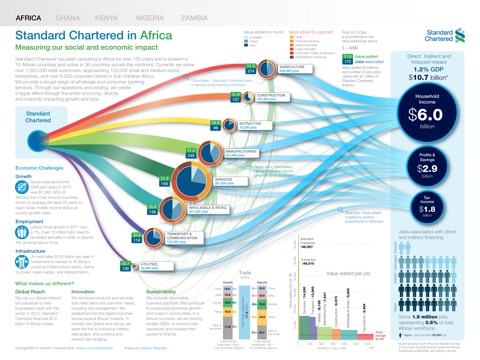
Impact Africa app for iPhone and iPad
Developer: Standard Chartered Bank
First release : 22 May 2014
App size: 39.7 Mb
This interactive visual summary was designed to portray findings from "Banking on Africa", an independent research report on the social and economic impact of Standard Chartered Bank activities in Sub-Saharan Africa. It uses data from Standard Chartered operations in Ghana, Kenya, Nigeria, and Zambia as well as macro-economic data from these countries.
The report illustrates that the banking sector plays a key role in the development and growth of national economies and that Standard Chartered, as one of the oldest and largest banks in many of the countries where it is present, is an important player in that sector.
The visual summary shows the myriad of economic interlinkages and how countries differ with respect to the complexity of their economies. It illuminates how diverse economic sectors are in terms of value added, employment and intermediary demand from other sectors. It also highlights how small and medium-sized enterprises are powerful job creators within the region.
International banks are particularly significant because of their ability to mobilise international capital and to finance global trade, both of which are critical to sustained growth. Developing nations tend to struggle to finance investments with domestic savings and consequently rely on international markets as a source of finance. Banks such as Standard Chartered help to fill this gap as they have access to global markets in addition to mobilising local capital.
- Use the top navigation to view and compare summaries for 4 African countries and Africa as a whole.
- Tap the pie charts to see additional Sector details
- Tap other graphs for a larger view or more background information



